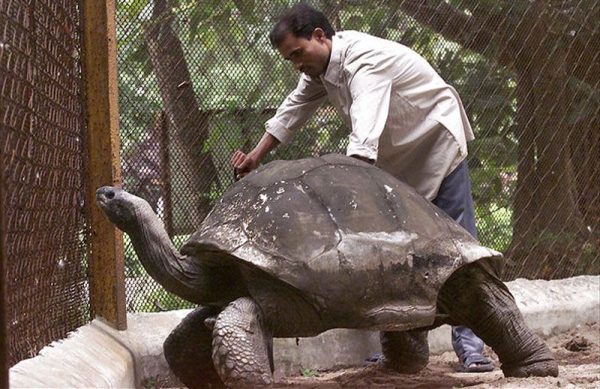Turtles and tortoises are some of the most long-lived members of the reptile family. Even small species that are typically kept as pets, like box turtles and terrapins, live between 30 and 40 years if they’re kept healthy. Larger species such as sea turtles are estimated to live about 80 years. The giant tortoise, the largest of all land turtles, typically lives at least a century. Some have even been known to live for more than 200 years! But what is the mystery behind the giant tortoises’ long life span?
There is predominantly no hard and fast answer for why turtles and tortoises live so long. Some scientists however attribute this to a few theories, including the slow rate of their metabolisms, naturally healthy lifestyles and evolutionary theories regarding reproduction. But never the less, the longevity of a turtle’s life depends on surviving predators, pollution and other environmental risks. Outcastly, nothing beats nature. New hatchlings are especially vulnerable to predators until their shells harden. As for domestic turtles, whether they live out the full extent of their natural lifespan depends largely on the type of care they receive and how their health is kept.
Other sources however suggest the reason as to why turtles have such long lifespans is their slowness. Turtles grow at a relatively very slowly rate throughout their lives. The slow metamophosis prevents them from aging in the same way birds and mammals do. Thanks to their slow metabolisms, they can survive long periods without food or water, which also gives them a greater chance of survival in harsh conditions over a relatively long period.
Another explanation to the exciting mystery is that the long lives of turtles and tortoises gives them an evolutionary advantage that aids in effective reproduction. Wild turtles tend to live in harsh environments that aren’t always conducive to breeding. Their long lifespans provide them with more opportunities to procreate. These natural herbivores also have natural protection against predators in their tough shells and thick armored skin, which unlike animals desist from being prey. This gives them the luxury of being able to take their time reproducing.
To further explain the mystrery, the longest-lived of all the turtle species, the Galapagos giant tortoise, eats a strict vegetarian diet that’s full of greens and free of fat and cholesterol. These slow-moving gentle giants are extremely docile and peace-loving creatures that generally live stress-free lives. This combination of calm and healthy living is likely another explanation for their extreme longevity.

All explained, if you don’t mind the pace, it’s not bad to be a giant tortoise. After all, apart from generally living a stress free life style will observing a purely vegetarian diet, it’s life span is often more than 100 years. Guess that does the magic. All this is majorly credited to a slow metabolism and a heart that beats at less than half the speed than that of humans.
A comparison of lifespan between selected animals:
Elephant — 69 years
Catfish — 60 years
Horse — 50 years
Chimpanzee — 40 years
Toad — 36 years
Lion — 30 years
Tiger — 25 years
About Guide2Uganda
Guide2Uganda (www.guide2uganda.ug) is the most comprehensive source of information about Uganda that exists on the web, with more content on Uganda and surrounding towns, attractions, museums and galleries than any other online guide that currently exists for Uganda as well as being a dynamic news and comprehensive events driven site with content being added daily.
According to WeFollow & Peer Index (whom both measure online influence) we are among the most influential online media organizations in Uganda. We were also awarded for ‘’Best Destination Website in Uganda’’ by Jumia Travel Uganda in the 2017-2018 Africa Travel Awards. If you are planning a visit to Uganda you can always reach us on; info@guide2uganda.ug




